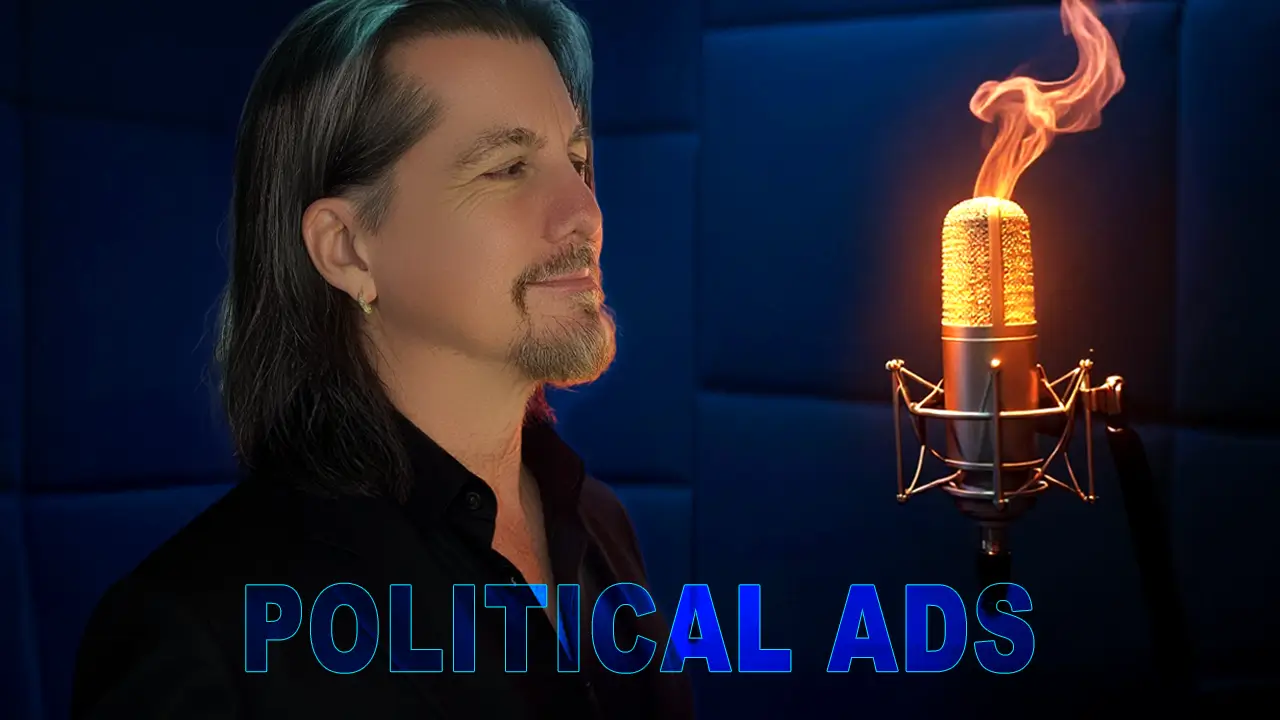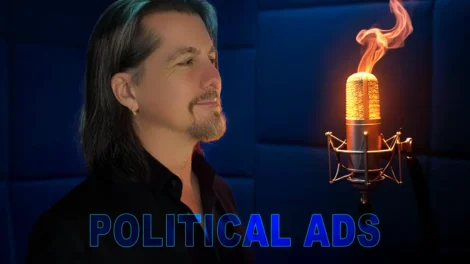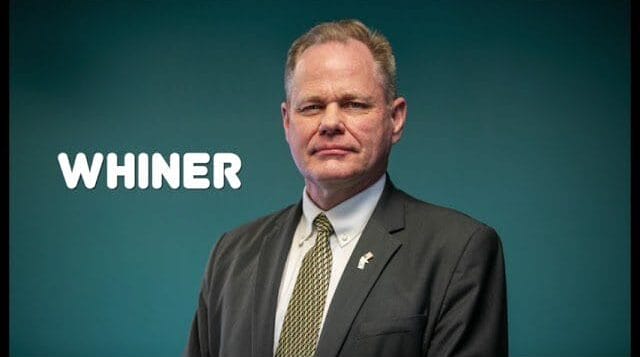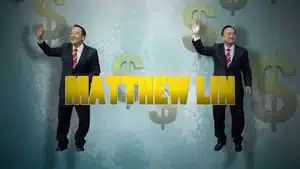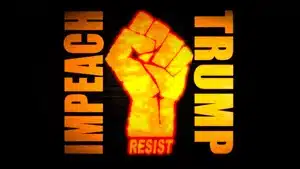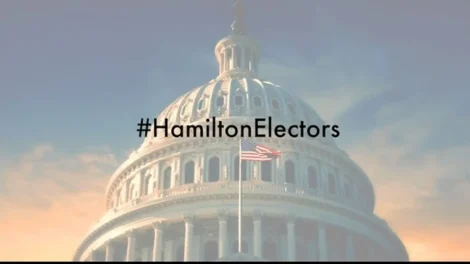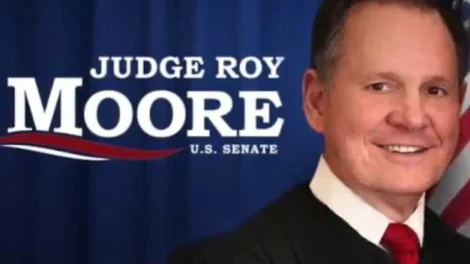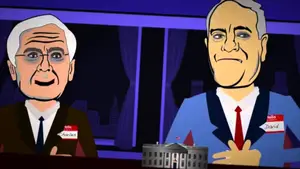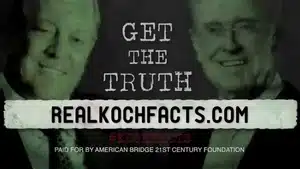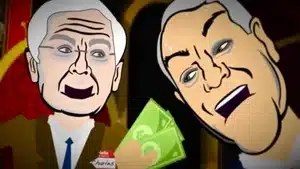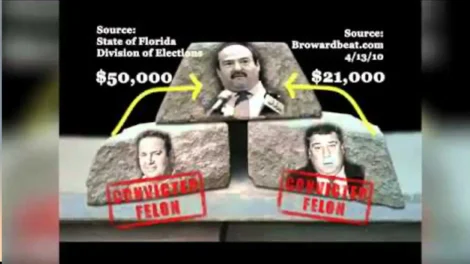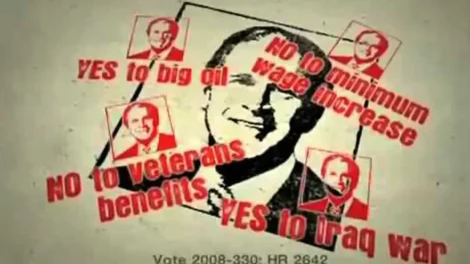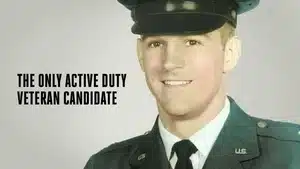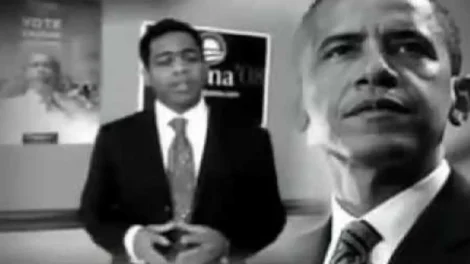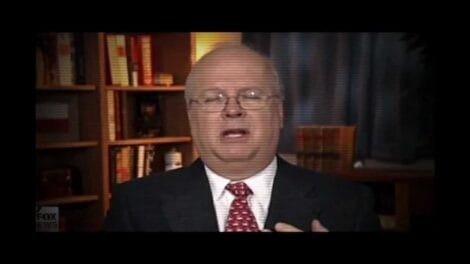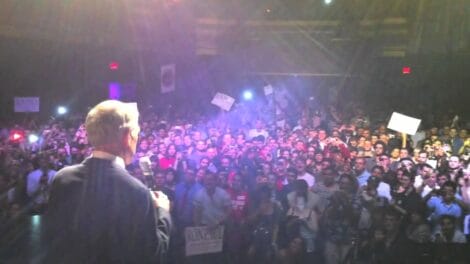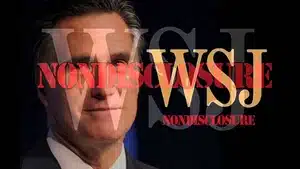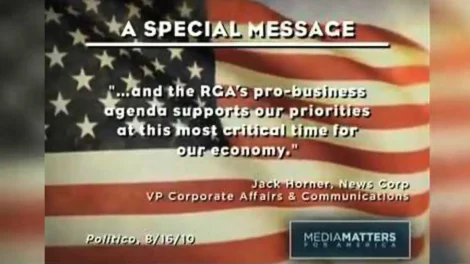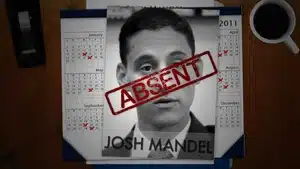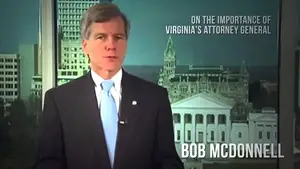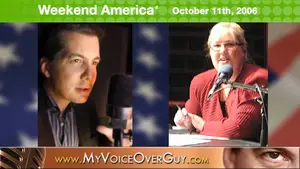Or am I…Comrade?
VO artists vote along “partay” lines, usually at some Happy Hour.
Political Voice Over: D.C. Douglas
D.C. Douglas, a versatile and highly sought-after voice actor, has made significant contributions to the world of political advertising. With his distinctive voice and ability to convey a wide range of emotions, Douglas has become a go-to talent for political campaigns across the ideological spectrum. His work in this arena has helped to shape public opinion, inform voters, and ultimately influence the outcome of elections at the local, state, and national levels.
Political television and radio commercials play a crucial role in modern campaigns, allowing candidates and interest groups to communicate their messages directly to the electorate. These advertisements come in various forms, each designed to achieve specific objectives and target different segments of the voting population. Throughout his career, D.C. Douglas has lent his voice to a diverse array of political ads, demonstrating his versatility and ability to adapt to the unique demands of this specialized field.
One common type of political commercial is the biographical ad, which seeks to introduce a candidate to the voters and highlight their personal story, qualifications, and values. These ads often feature a narration that guides the viewer through the candidate’s life, emphasizing their accomplishments, challenges overcome, and the experiences that have shaped their political beliefs. D.C. Douglas has provided voice-overs for numerous biographical ads, using his warm and engaging tone to help establish a connection between the candidate and the audience.
Another prevalent form of political advertising is the issue-based ad, which focuses on specific policy proposals or stances that a candidate or party wants to promote. These commercials may delve into topics such as healthcare, education, taxes, or foreign policy, presenting the candidate’s position and contrasting it with that of their opponents. Douglas’ ability to convey authority and credibility has made him a popular choice for issue-based ads, as his voice can help to lend weight and legitimacy to the arguments being presented.
Attack ads, which aim to undermine an opponent’s character, record, or policy positions, are also a staple of modern political campaigns. These commercials often employ a more aggressive tone, highlighting perceived flaws, inconsistencies, or controversies in an effort to sway public opinion against the targeted candidate. D.C. Douglas has demonstrated his range as a voice actor by participating in attack ads, using his versatile skills to deliver pointed critiques and biting commentary that can leave a lasting impact on viewers.
In contrast to attack ads, positive ads seek to promote a candidate’s strengths, accomplishments, and vision for the future. These commercials often feature uplifting music, inspiring imagery, and a hopeful message that resonates with voters. Douglas’ ability to convey sincerity and optimism has made him a natural fit for positive ads, as his voice can help to instill confidence and trust in the candidate being promoted.
Throughout his career, D.C. Douglas has provided his services to political campaigns and interest groups across the political spectrum, demonstrating his professionalism and commitment to his craft. By lending his voice to candidates and causes from various political parties, Douglas has showcased his ability to adapt to different styles and messaging, ensuring that his performances are always in line with the goals and values of the campaigns he works with.
Douglas’ involvement in political advertising has not been limited to any one party or ideology. He has voiced ads for Democratic, Republican, and independent candidates, as well as for a wide range of issue-based organizations and advocacy groups. This willingness to work with clients from diverse political backgrounds underscores Douglas’ versatility as a voice actor and his dedication to providing high-quality performances that effectively communicate the intended message, regardless of his personal beliefs.
One example of Douglas’ work in political advertising was his participation in a series of ads for a Democratic congressional candidate. In these commercials, Douglas used his warm and authoritative voice to highlight the candidate’s background, experience, and commitment to fighting for the interests of their constituents. His performance helped to establish the candidate as a relatable and trustworthy figure, ultimately contributing to their successful campaign.
In another instance, Douglas lent his voice to a Republican gubernatorial candidate’s issue-based ads, which focused on the candidate’s stance on taxes, job creation, and government accountability. By conveying a sense of conviction and expertise, Douglas’ voice-over work helped to bolster the candidate’s credibility and position them as a strong advocate for the state’s economic interests.
Douglas has also provided voice-overs for independent and third-party candidates, demonstrating his willingness to support voices outside of the traditional two-party system. In one notable example, he voiced a series of ads for an independent candidate running for a state legislature seat, helping to raise the profile of their campaign and bring attention to the issues they championed, such as political reform and government transparency.
Beyond his work for individual candidates, D.C. Douglas has also lent his voice to issue-based organizations and advocacy groups spanning the political spectrum. For instance, he has provided voice-overs for ads promoting environmental protection, gun control, and healthcare reform, as well as for commercials advocating for tax cuts, deregulation, and school choice. By working with a diverse array of clients, Douglas has demonstrated his ability to effectively communicate a wide range of political messages and perspectives.
Douglas’ success in the realm of political advertising can be attributed to several key factors. First and foremost, his versatile vocal skills and ability to adapt to different styles and tones have made him an invaluable asset to campaigns seeking to connect with voters on a personal level. Whether he is conveying empathy, authority, or urgency, Douglas’ performances are always crafted to resonate with the target audience and support the objectives of the ad.
Moreover, Douglas’ professionalism and dedication to his craft have earned him a reputation as a reliable and effective voice actor in the political advertising industry. His ability to deliver high-quality performances under tight deadlines and in high-pressure situations has made him a go-to talent for campaigns and organizations in need of a powerful and persuasive voice.
In addition to his vocal skills and professionalism, Douglas’ willingness to work with clients from across the political spectrum has set him apart from many of his peers. By maintaining a non-partisan approach to his work, Douglas has demonstrated his commitment to the art of voice acting and his respect for the democratic process, ensuring that his talents are available to a wide range of campaigns and causes.
As the landscape of political advertising continues to evolve, with the rise of digital media and targeted messaging, D.C. Douglas’ contributions to this field remain as relevant and impactful as ever. His ability to connect with audiences, convey complex ideas, and inspire action through his voice-over work has made him an integral part of countless political campaigns and initiatives.
In the end, D.C. Douglas’ extensive work in political television and radio commercials has showcased his versatility, professionalism, and dedication to his craft. By lending his voice to a wide range of candidates, parties, and causes, Douglas has played a significant role in shaping public discourse and influencing the outcome of elections at all levels of government. As a non-partisan voice actor committed to the art of persuasive communication, D.C. Douglas has established himself as a valuable asset to the political advertising industry and a respected figure in the world of voice-over performance. — TSG Management
“`html
Famous Political Commercials and Their Evolution Throughout the Years
Political commercials have been a cornerstone of election campaigns for decades, influencing voters’ perceptions and decisions. These advertisements range from positive portrayals of candidates to negative attacks on opponents, employing various strategies to sway public opinion. Here’s a comprehensive look at some of the most famous political commercials throughout the years and the different types that have emerged.
The Evolution of Political Commercials
Political commercials have evolved significantly, reflecting changes in media, technology, and campaign strategies. From the early days of radio to the digital age, these ads have adapted to reach voters more effectively.
Types of Political Commercials
1. Biographical Ads
Biographical ads focus on the candidate’s background, character, and achievements. These commercials aim to create a positive image and build a personal connection with voters.
Example: “The Man from Hope” (1992)
Bill Clinton’s 1992 campaign ad, “The Man from Hope,” is a quintessential biographical commercial. It highlighted Clinton’s humble beginnings in Hope, Arkansas, and his dedication to public service. The ad effectively humanized Clinton and connected with voters on an emotional level, contributing to his successful presidential campaign.
2. Issue-Based Ads
Issue-based ads focus on specific policy positions or legislative achievements. These commercials aim to inform voters about the candidate’s stance on important issues and how they plan to address them.
Example: “Morning in America” (1984)
Ronald Reagan’s “Morning in America” ad is one of the most famous issue-based commercials. It showcased the economic improvements and optimistic future under Reagan’s presidency. The ad’s positive tone and patriotic imagery resonated with voters, reinforcing Reagan’s message of prosperity and stability.
3. Attack Ads
Attack ads are designed to criticize and undermine opponents. These commercials often highlight the opponent’s weaknesses, scandals, or policy failures, aiming to sway undecided voters by creating doubt and fear.
Example: “Daisy” (1964)
One of the most infamous attack ads is Lyndon B. Johnson’s “Daisy” commercial from 1964. The ad juxtaposed a young girl picking flowers with a nuclear explosion, suggesting that Barry Goldwater’s presidency would lead to nuclear war. The ad’s dramatic and emotional impact helped Johnson secure a landslide victory.
4. Contrast Ads
Contrast ads compare the candidate with their opponent, highlighting their strengths while emphasizing the opponent’s weaknesses. These commercials aim to present a clear choice to voters.
Example: “Prouder, Stronger, Better” (1984)
Another iconic ad from Reagan’s 1984 campaign, “Prouder, Stronger, Better,” contrasted the positive changes during Reagan’s first term with the struggles of the past. The ad’s hopeful message and clear contrast with previous administrations helped reinforce Reagan’s appeal to voters.
5. Fearmongering Ads
Fearmongering ads aim to instill fear and urgency among voters. These commercials often use dramatic imagery and rhetoric to highlight potential threats or dangers posed by the opponent.
Example: “Willie Horton” (1988)
George H.W. Bush’s “Willie Horton” ad in the 1988 presidential campaign is a prime example of fearmongering. The ad focused on a Massachusetts furlough program that allowed convicted murderer Willie Horton to commit additional crimes. It was used to criticize Michael Dukakis’s policies on crime, creating a climate of fear that significantly impacted the election’s outcome.
Famous Political Commercials Throughout the Years
1. “I Like Ike” (1952)
Dwight D. Eisenhower’s “I Like Ike” commercial is one of the earliest and most successful political ads. Created by Walt Disney and featuring a catchy jingle, the ad portrayed Eisenhower as a likable and trustworthy candidate. Its upbeat and engaging style helped Eisenhower connect with voters and win the election.
2. “Yes We Can” (2008)
Barack Obama’s “Yes We Can” ad, featuring a music video by will.i.am, utilized celebrity endorsements and a powerful message of hope and change. The ad’s innovative approach and emotional resonance mobilized a wide range of voters, particularly young people, and played a crucial role in Obama’s victory.
3. “It’s Morning Again in America” (1984)
Reagan’s “It’s Morning Again in America” ad is often cited as one of the most effective political commercials. Its optimistic message and compelling visuals celebrated the progress made under Reagan’s leadership, reinforcing his campaign theme of national renewal and prosperity.
The Impact of Political Commercials
Political commercials play a critical role in shaping public perception and influencing election outcomes. They serve as powerful tools for candidates to communicate their messages, differentiate themselves from opponents, and connect with voters on an emotional level. Over the years, the evolution of these ads has reflected broader changes in media and technology, demonstrating the enduring importance of effective political communication.
For more insights into the history and impact of political commercials, check out these authoritative sources:
Explore the latest trends in political advertising at Politico.
Stay updated on political campaigns and strategies at NPR.
Learn about the history and evolution of political ads at The New York Times.

